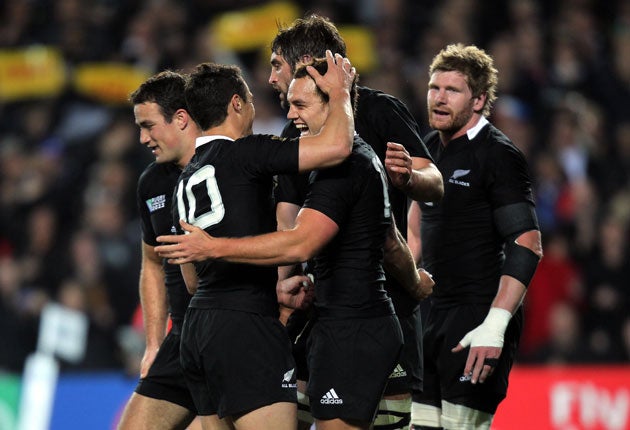
They have said it many times,in many ways, but it can be summarised in one sentence from Craig Dowd, who told a radio audience last week: "The only team who's going to beat the All Blacks is the All Blacks." And the listeners up and down this country – simultaneously en fête and on the edge of a nervous breakdown – smiled and nodded and agreed and crossed their fingers, trusting to God or their own personal spirit that the craggy-faced old prop was right.
There have been 1,109 men, including Dowd, accorded the status of an All Black down the years: 794 of them in Tests, 551 since the war. And it has felt like most of those still in the land of the living have popped up this last fortnight to declare their faith in Richie McCaw's team to win the World Cup; to win it back 24 years after the team captained by David Kirk and coached by Brian Lochore took the inaugural final on home soil.
Sir Brian himself, a rock-hard No 8 in the mould continued today by flanker McCaw, took time off from lambing on the family farm to declare that "the fact the team have been on a visit to Christchurch has made them aware they're playing for a lot of people". They could hardly not be, such is the fervour for this tournament, but awareness of past pitfalls is a key counter-point to the former centre Craig Innes's comment that "if the All Blacks play the best they can play, and everyone else does the same, then the All Blacks win".
History and form suggests the dangers are hubris, half-backs and happenstance. "I'd expect a dropped goal or two when we get to the quarters, semis and final," said former flanker Alan Whetton, referring both to the rare drop by Dan Carter against Australia in Auckland this summer – only the fly-half's third in 83 Tests (he made it four in 86 yesterday, in a game which produced injury worries for a handful of players) – and the supposed error by McCaw in not seeking three points by that method in the closing minutes of the 2007 quarter-final defeat by France.
The charge that stuck most agonisingly was that they stuck to their running game when a drop was needed, but on that thrilling Cardiff night the running game was working. A try by Rodney So'oialo in the 64th minute had New Zealand leading 18-13, there was good reason to expect more, and when they did fall behind – with Carter and his back-up Nick Evans off the field – they tried a drop through Luke McAlister.
Would McCaw react differently in a similar predicament now? You sense the standard-bearers of this nation would defend to their graves the notion of winning by doing what they know best.
Carter, we are told, has been nursing a back problem. In 2007, his calf was strapped for the quarter-final and gave way in the second half. The daily bulletins now have the feel of watching a slasher movie: we catch the odd glimpse of the bad guy before – slash, bang, wallop – Carter will drop out and either Colin Slade or the scrum-half Piri Weepu will be asked to step in (the more talented Evans, of course, is on the other side of the world at Harlequins).
The scrum-half jersey has fallen in turns to the one-dimensional Jimmy Cowan, the versatile Weepu or Andy Ellis, yesterday's bench reserve. Innes was on TV with another former All Black who went to league, Matthew Ridge, and both thought Sonny Bill Williams had yet to prove himself as a starter; hence Williams's selection as a centre, wing and replacement. Steve McDowall, a prop in the 1987 team, disagreed with the rotation by coach Graham Henry, arguing any changes should be on merit alone. Lochore pointed out that a seven-week competition demands rest. Both would hail the fairly settled front five that appeared to rediscover the knack of good scrummaging a year or two ago as a huge boon.
So what else remains? With home advantage, a team of all the talents and a brains-trust coaching staff whose experience dwarfs that of England's beer-loving boys, do New Zealand have only to overcome the cloying uncertainty that the race is not yet run? There is a popular theory that Australia know how to beat them, while the world champions South Africa defeated them twice at home in 2008 and 2009. Yet New Zealand have not lost to anyone in 24 Tests at Eden Park – venue for all their knock-out games – since 1994.
Yet the Wallabies have shown often that attacking the All Blacks' slavishly wide game hard and playing off the mistakes can provide an edge. The last word, then, to a non-New Zealander. "You can't just push it wide and expect the All Blacks to have chinks in their defence," said Nick Farr-Jones, Australia's winning World Cup captain in 1991 when they knocked the All Black favourites out in the semi-final.
"Taking time and space from them has always been the key. Put pressure on up front such that you take space away from Dan Carter, and by taking space from him, you upset the scrum-half as well. And we had to bury the best player, which was Michael Jones [the great forerunner of McCaw now], in rucks and scrums. Nothing has changed in 20 years."
Join our commenting forum
Join thought-provoking conversations, follow other Independent readers and see their replies
Comments